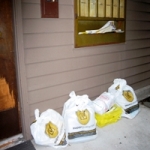Good news, everyone! I invented something amazing. It’s made from recycled materials, and we’re shrinking its environmental footprint by 267 percent!
Here’s the best part: while it doesn’t actually do anything, it’s 100 percent recyclable so you can toss it right in your bin!
Cool, right?!
Pardon the snark, but that’s what came to mind when I read this recent report from the Local Search Association. It’s full of juicy stats commending the industry for using more recycled materials and arguing that phone books are more environmentally responsible than searching on the internet.
Putting aside fuzzy math (while my smartphone does impact the planet, it also does a lot more than just searching for business phone numbers—making the resource-to-productivity ratio much higher than a single-purpose phone book), it is good that these companies are making sure their product fits into the waste stream.
But cutting through the hype, the most unsustainable thing about phone books is that even though most people don’t want ‘em and don’t use ‘em, they still get delivered. No matter how much you shrink the footprint of your product, you’re driving around truckloads of phonebooks that go from doorstep to recycle bin.
Seattle has taken steps: just today, the city announced that 75,000 residents and businesses—over one-fifth of home and business addresses—have opted out of phonebooks. As someone who deals in internet response rates for a living (I handle Sightline’s email products and outreach), I can tell you that for every person who goes online to opt-out, there’s another who wants to but doesn’t (too busy, too lazy, don’t know how).
Now, I don’t want to downplay the city’s efforts. An opt-out system is certainly better than no system at all. The fight city officials went through to get it is commendable. And we’ve successfully opened the door to stemming the tide of yellow pages—420,000 books a year, according to the city. It’s no trivial matter.
The fact that so many Seattlites have said “No” is an indicator of just how unpopular these books are. If the phone book publishers really cared about sustainability, they’d make an opt-in system.










uscjeremy
I like this article except for your fuzzy math: clearly, if one in five addresses opted out, then it can’t be literally true that “for every person who goes online to opt-out, there are a dozen more who want to but don’t.” There at most 4 other such people.
Eric Hess
Thanks, Jeremy. I was exaggerating, but did so poorly. I’ve amended the post.
Rhonda Peterson
The last phone books delivered to my condo are labeled “use through June 2011.” No phone books have been delivered to my office in downtown Seattle for years. The last time I searched online to find a shoe repair shop in Zip code 98101 so I could get something fixed on my lunch hour, the search results came back giving first a shop in Lynnwood!
So I’d still like to have phone books. But the phone company seems to be saving money by not delivering them anymore!
Amy Healy
Eric, thanks for taking a look at the report. Like many of us, I’m attached to my mobile phone for reasons other than just search, however we were intending to highlight that all search tools – electronic and print – have an impact on the environment. For those who wish to stop delivery in favor of online search options, we maintain a national opt-out site at http://www.YellowPagesOptOut.com.
Yellow Pages offer an easy and free source of information for those who like supporting local businesses. Last year, more than 3 in 5 consumers referenced the print directory according to third-party research. Yellow Pages remain a valuable resource for the more than 3 million small business advertisers who rely on them to find new customers. You can learn more about our tools for helping local businesses get found at http://www.localsearchinsider.com.
Amy Healy, Public Policy & Sustainability, Local Search Association
Eric Hess
Thanks for the response, Amy. My issue with your report is the claim that “electronic search devices” use more energy and materials than a print directory. It’s a gross misrepresentation, since a device can do much more–hence providing much more value–for the resources that go in to it. That said, it’s also good to consider the energy that goes in to those devices.
If Yellow Pages are devoted to sustainability, why not enact a simple opt-in system? You could email stamped post cards to every household on your delivery list. If someone returns the post card, they get a book. No postcard, no book. I suspect you’d cut down on the waste side of the equation quite dramatically, while still providing a product to those who have requested it.
Elegant, no?